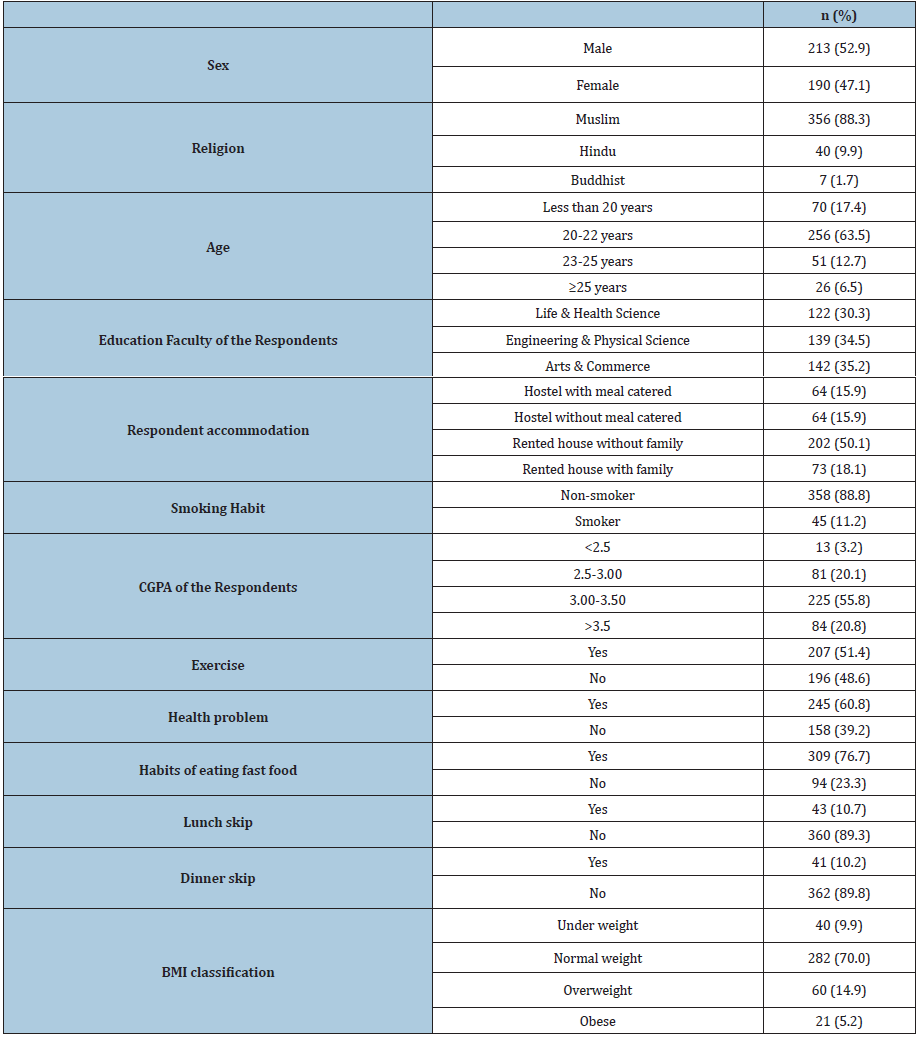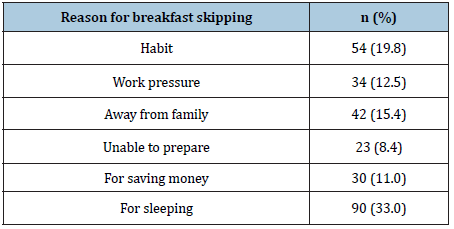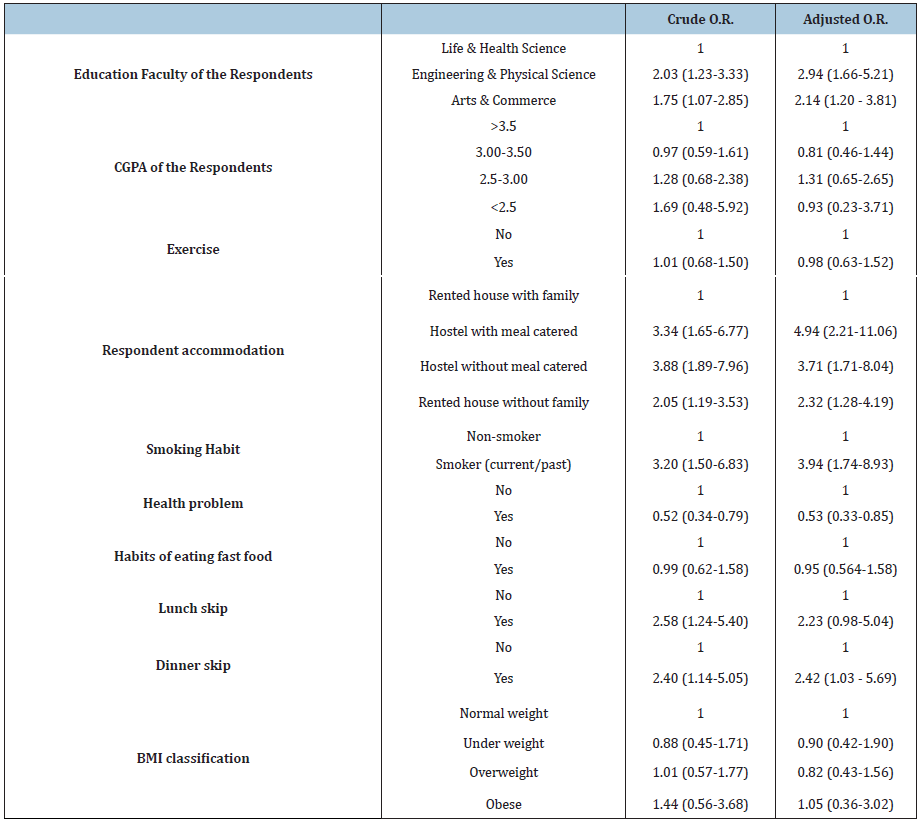- Submissions

Full Text
Examines in Physical Medicine and Rehabilitation: Open Access
Breakfast Skipping and Associated Factors: Experience from Students at Public University in Noakhali District, Bangladesh
Sheta Biswas1, Syeda Saima Alam2*, Abu Hanif Sayem2, Mohsin Hossain2, Shahid Hasan Mithu2, Sharmeen Akther2, Nahian Rahman3 and Abu Eabrahim Siddique4
1Department of Biochemistry and Molecular Biology, Noakhali Science and Technology University, Noakhali- 3814, Bangladesh
2Department of Food Technology and Nutrition Science, Noakhali Science and Technology University, Noakhali- 3814, Bangladesh
3Institution of Nutrition and Food Science, University of Dhaka, Bangladesh
4Department of Microbiology, Henry Institute of Bioscience and Technology, Bangladesh
*Corresponding author: Syeda Saima Alam, Department of Food Technology and Nutrition Science, Noakhali Science and Technology University, Noakhali- 3814, Bangladesh
Submission: September 19, 2020; Published: October 28, 2020

ISSN 2637-7934 Volume3 Issue1
Abstract
Breakfast is often considered to be the most vital meal of the day as it is known to provide energy for the brain and improve learning capabilities. A simple random study was conducted among 403 students on a total of 3 university students in Noakhali district, Bangladesh. The objective of the study was to find the prevalence of breakfast skipping and its associated factors. Data collection was conducted via a selfadministered pre-tested questionnaire. The prevalence of breakfast skipping among respondents of the present study was 53.85%. Among students, about 213 (52.9%) were male and 190 (47.1%) were female. Univariate and bivariate analysis were used to describe the variables as well as to study the association between two variables, respectively where there was significant association, multivariate analysis was conducted to control for confounders. Factors found to be significantly associated (p<0.05) with breakfast skipping were faculty, academic performance, exercise, accommodation, smoking habit, skipping of lunch. Respondents who stayed in the houses with there were less likely to skip breakfast compared to those staying in hostels with meals catered (OR: 4.94, 2.21-11.06), hostels without meal catered (OR: 3.71, 1.71-8.04) or rented houses without family (OR: 2.32, 1.28-4.19). Respondent from Engineering & Physical Science (OR: 2.94, 1.66-5.21) and Arts & Commerce faculty (OR: 2.14, 1.20-3.81) had higher odds for skipping breakfast compared to the Life & Health Science. Study respondents who were smoker intended to skip breakfast (OR: 3.94, 1.74-8.93) higher than non-smoker. Respondents who skipped their breakfast have higher odds of skipping the lunch (OR: 2.23, 0.98-5.04) as well as the dinner (OR: 2.42, 1.03-5.69). The prevalence of breakfast skipping among the university students was high. Health promotion strategies should be initiated to encourage all students to eat breakfast regularly.
Keywords: Breakfast skipping; Noakhali; Bangladesh
Introduction
Breakfast is generally accepted to be the most important meal of the day. Eating breakfast is considered as one of the factors that regulate an individual’s internal biological clock in relation to circadian rhythm [1]. Compensation of skipping breakfast cannot be overcome by other meals throughout the rest of the day [2]. Because breakfast provides a significant proportion of total nutrient intake daily [3-5] with lower intakes of lipid riches food while augmenting the intake of carbohydrate [6,7], dietary fibre and certain micronutrients [8,9]. So, breakfast may reduce the risk of obesity and other chronic diseases such as heart disease, cancer, diabetes, and osteoporosis [10-12].
Breakfast consumption has been positively associated with good academic performance, attention, and concentration, but it is skipped mostly due to lack of time [13-15]. It may develop our cognitive function related to memory, school attendance and test grades [2]. As adolescence is a period of enhancing one’s cognitive, physical and psychosocial development, so balanced diet should be continued during this period [16]. Taking a complete and well- balanced breakfast avoids hunger feelings in the morning which can lead to nibbling snack foods, particularly those high in sugar and fat [17]. On the contrary, breakfast skipping persuades excessive snacks intake which is ultimately responsible for lunch skipping. Thus, it is associated with undesirable health outcomes such as insomnia [18], increased blood pressure [19] and cluster with health-compromising behaviors such as smoking, alcohol intake etc. Thereby, a sedentary lifestyle and obesity have been noticed to be more common among those who skip breakfast than the breakfast eater [20]. It can influence body weight through extreme laziness and impaired physical activity [13,21,22].
The age group between 18 to 25 years are considered as young adults whose are not so conscious about any health or nutrition education as compared to children and adults. When these young adults leave home due to their university life and initiate to live independently, good dietary habits gained from home will be declined [23]. The young adults are acquired the knowledge of health and nutritional perspectives from college or university by their honorable professor [24]. Therefore, a study was initiated in a public university in Noakhali, Bangladesh with the intention of identifying their dietary habits and associated factors contributing to breakfast skipping among the undergraduates. However, the objective of this study was to evaluate the prevalence of breakfast skipping and associated factors among university students.
Materials and Method
This was a descriptive cross-sectional study carried out from December 2019 to February 2020 among three university students of Noakhali, Bangladesh: Noakhali Science and Technology University, Noakhali Government College, Noakhali Government Women College. A simple random sampling was used for selecting the participants. The research data were collected via a selfadministered, structured questionnaire developed on the basis of previously published research. The validated questionnaire was organized into three distinct sections-
A. Section 1: Socio-demographic information including participant’s age, gender, religion, education faculty, CGPA, accommodation, anthropometry etc.
B. Section 2: Some personal characteristics of the students including the health problem, cigarette smoking, physical exercise, lunch skipping, dinner skipping, health problem fast food consumption etc. and
C. Section 3: Information regarding reasons for breakfast skipping.
Individuals were considered as breakfast skipper when they reported that they did not take breakfast for two consecutive mornings. This study was approved by Ethical Review Board of Noakhali Science and Technology University, Noakhali. The researchers clarified the objective of this research and we obtained informed consent from the respondents
Statistical analyses
Statistical analyses were performed using the Statistical Packages for Social Sciences (IBM SPSS statistics, version 21.0, SPSS, USA) software. Only p-values of <0.05 were considered as statistically significant. Univariate analysis was used to describe the variables as well as bivariate analysis was used to study the association of two variables and when there was significant association, multivariate analysis (logistic regression) was conducted to control for confounders. Odds Ratio (OR) and 95% confidence interval are reported where applicable. Receiver Operating Curve (ROC) was drawn for the final Logistic Regression model.
Result
Table 1: General characteristic of the respondents (n=403).

The total number of respondents in the survey was 403. As shown in Table 1, there were slightly more males than females in the sample. The religious distribution reflected the country’s religious distribution with Muslims being the largest group, followed by Hindu and Buddhist. About 64 % of the respondents were in the age group of 20 to 22 years and they came from a variety of backgrounds as shown by the distribution of students from various faculties. There about equal number of respondents from three faculties those are Life & Health Science (30.3%), Engineering & Physical Science (34.5%) and Arts & Commerce (35.2%). About 32% of the respondent stayed in the university’s hostels which could be divided into hostels with food catered and hostels without food catered. Those who stayed in hostels with food catered had included meals in their payment with accommodation and they were expected to take their meals in the hostel. Those who stayed in hostels without food catered needed to pay when they purchased food from the cafeterias. Around 89 % of the respondents are found to be non-smoker in our study. Most of the respondent have CGPA in the range of 3.00- 3.50 (55.8%). We have found that 51.4 % responded are involved in the daily 30min exercise and 60.8% have health problem. We also found 76.7% respondent have habits of eating fast food, 10.7% skip lunch and 10.2% skip dinner. Most (70%) of the respondents have normal body-weight.
Table 2: Factors of Breakfast skipping.

Table 2 shows the associated factors of breakfast skipping. Reasons for skipping breakfast were habit (n = 54 or 19.8%), work pressure (n=34 or 12.5%), away from family (n=42 or 15.4%), unable to prepare (n=23 or 8.4%), for saving money (n=30 or 11.0%) and sleeping (n=90 or 33.0%). Factors found to be significantly associated (p<0.05) with breakfast skipping were faculty, academic performance, exercise, accommodation, smoking habit, skipping of lunch (Table 3). Smoking was significantly (p<0.001) associated with breakfast skipping. Habits of eating fast food, skipping dinner, health problem and BMI were not significantly associated with breakfast skipping.
Table 3: Association of variables with breakfast skipping. BMI was calculated as body weight (Kg) divided by height squared (m2). p values were obtained from χ2 test.

Table 4: Crude and adjusted odds ratio (O.R) for the confounders on breakfast skipping. 1 is used for the referent groups.

After adjusting for all the above confounders using multiple logistic regression, faculty, accommodation, smoking habit, skipping lunch and skipping dinner were found to be significantly associated with breakfast skipping (p<0.05) as shown in Table 4. We found that respondent from Engineering & Physical Science (OR: 2.94, 1.66-5.21) and Arts & Commerce faculty (OR: 2.14, 1.20- 3.81) had higher odds for skipping breakfast compared to the Life & Health Science.
Respondents who stayed in the houses with there were less likely to skip breakfast compared to those staying in hostels with meals catered (OR: 4.94, 2.21-11.06), hostels without meal catered (OR: 3.71, 1.71-8.04) or rented houses without family (OR: 2.32, 1.28-4.19). Study respondents who was current or past smoker have higher (OR: 3.94, 1.74-8.93) tendency of breakfast skipping compared to those who were non-smoker. Respondents who skipped their breakfast have higher odds of skipping the lunch (OR: 2.23, 0.98-5.04) as well as the dinner (OR: 2.42, 1.03-5.69). The area under the Receiver Operating Curve (ROC) was 0.653, meaning that the above variables were able to explain 65.4% of breakfast skipping.
Discussion
Breakfast is considered to be the most vital meal of the day because it provides energy for our brain to develop learning capabilities. Any kinds of foods which is eaten from the time a student gets up in the morning until 45min after the start of their school day is defined as breakfast [25]. If anyone does not take breakfast for two consecutive mornings, we can define him as “breakfast skippers”. On the contrary, “Breakfast eaters” are those who take their breakfast at least one of two consecutive days [26].
The prevalence of breakfast skipping among respondents of the present study is 53.85%. However, our finding is much higher than some studies conducted among urban adults whereas 35.8% respondents skip breakfast in Dhaka [27], 23.8% in US [28] and 28.9% in China [29]. The present study finding was lower than the studies carried out in Fiji and Ghana where the prevalence was 68% and 71.92%, respectively [30,31]. In our study, it was reported by skippers that the main reasons for breakfast skipping were sleeping (33%), habit (19.8%), away from family (15.4%) and for saving money (11.0%). The previous studies performed in Bangladesh and other countries also reported the common reasons for breakfast skipping was habit, work pressure, lack of time, away from family, unable to prepare, did not like to eat early not being hungry, for oversleeping [27,31-36]. The major reason for the respondents for skipping breakfast was sleeping. That result might reflect the long-term use of social media in night and so they often failed to manage their time in the morning for breakfast as they were in rush to attain their lecture in the university.
In this study, Engineering & physical science as well as Arts & Commerce faculty were found to skip breakfast 2.94 and 2.14 times higher, respectively than students of life & health science. Another study conducted among the university students that exhibited respondents majoring in Arts & Economics had 1.40 times risk of breakfast skipping compared to those majoring in Life Sciences [33]. Lu Z et al. [37] observed that breakfast prevalence of medical students was higher than students from nonmedical faculties [35]. So, education faculty become an important factor for breakfast skipping. Consequently, non-life science undergraduates, especially who was from the Engineering & physical science and Arts & Commerce faculty need to disseminate more informative knowledge in healthier choices of food and also the importance of breakfast. The present study found that respondents who stayed with their family were less likely to skip breakfast compared to those staying in the dormitory or rented house without family. The study by Moy et al. [35] showed that undergraduates who stayed in their own houses were less likely to skip breakfast possibly due to their family members preparing breakfast for them [33].
Breakfast skipping was associated with health-compromising behaviors in adults and adolescents such as smoking [20]. In this study, respondents those were current or past smoker has been found to skip breakfast 3.94 times more compared to a non-smoker. Our findings were much higher than the studies conducted in Malaysia where smoker found to skip breakfast 1.20 times more compared to non-smoker (Moy et al., 2009), in Finland were 1.40 times more compared to non-smoker [20]. A study by Keski-Rahkonen et al. (2003) observed that those who skipped breakfast were more susceptible of skipping lunch or dinner as a consequence of consuming more fast food and snacked. However, the current study found that respondents who skipped breakfast had higher chance of skipping lunch (2.23) and dinner (2.42) [20].
Thereby, hunger in the morning can affect performance at school mainly due to lack of concentration [36]. Additionally, all sorts of positive effects like enthusiasm, mental alertness, interest, energy level can be appeared prominently all day long those one’s consumes breakfast regularly [37]. Several studies had shown that breakfast skipping was common among young adults in colleges and universities.
A study found that adults and adolescents were compelled to eat more for the rest of the day if they skip breakfast [38]. Thus, breakfast skipping was also associated with increased prevalence of obesity, but this study did not show significant results. Infrequent exercise, a low level of education, frequent alcohol use associated with breakfast skipping in both adults and adolescents. Frequent breakfast skippers were much more likely to exercise very little than infrequent breakfast skippers [20].
Therefore, as observed above, some predictions for skipping breakfast were essential for improving knowledge and consciousness among the undergraduates. The non-Life Science undergraduates especially Engineering & Physical Science, Arts & Commerce are more benefited by achieving knowledge in healthier choices of food. However, this study will be conductive for initiating effective awareness campaigns within the campus. By the way, this will be helpful to make the caterers of the cafeterias in the campus educated by improving food menu, cooking methods, taste, environment, policy, price etc.
There were a few limitations to this study that are needed to be discussed. First, the study did not represent all university students in Bangladesh. Second, as a rural state university, it contained a fairly homogenous student body. Therefore, findings would be more effective if data were collected from different university students in Bangladesh. However, the present study findings provide important and novel information about the prevalence and associated factors about breakfast skipping among university students. If this study can be expanded by conducting on different university students on the different part of Bangladesh it will then represent the scenario among all university students of Bangladesh.
Conclusion
The prevalence of skipping breakfast among the undergraduates of this university was 53.85%. The main factors influencing breakfast skipping were sleeping, habit, away from family, for saving money, faculties etc. These study results suggest health awareness campaigns or the introduction of healthy eating guidelines. These findings can provide good initiative to make people aware of the importance of eating breakfast.
References
- Fujiwara T, Nakata R (2010) Skipping breakfast is associated with reproductive dysfunction in post-adolescent female college students. Appetite 55(3): 714-717.
- Rampersaud GC, Pereira MA, Girard BL, Adams J, Metzl JD (2005) Breakfast habits, nutritional status, body weight, and academic performance in children and adolescents. J Am Dietetic Assoc 105(5): 743-760.
- Affenito SG, Thompson DR, Barton BA, Franko DL, Daniels SR, et al. (2005) Breakfast consumption by African-American and white adolescent girls correlates positively with calcium and fiber intake and negatively with body mass index. J Am Diet Assoc 105(6): 938-945.
- Albertson AM, Thompson D, Franko DL, Kleinman RE, Barton BA, et al. (2008) Consumption of breakfast cereal is associated with positive health outcomes: Evidence from the National heart, lung, and blood institute growth and health study. Nutr Res 28(11): 744-752.
- Ruxton CH, Kirk TR (1997) Breakfast: A review of associations with measures of dietary intake, physiology and biochemistry. Br J Nutr 78(2): 199-213.
- Boom A, Serra ML, Ribas L, Ngo J, Pérez RC, et al. (2006) The contribution of ready-to-eat cereals to daily nutrient intake and breakfast quality in a Mediterranean setting. J Am Coll Nutr 25(2): 135-143.
- Morgan KJ, Zabik ME (1984) The influence of ready-to-eat cereal consumption at breakfast on nutrient intakes of individuals 62 years and older. J Am Coll Nutr 3(1): 27-44.
- Williams P (2005) Breakfast and the diets of Australian adults: An analysis of data from the 1995 National nutrition survey. Int J Food Sci Nutr 56(1): 65-79.
- Song WO, Chun OK, Obayashi S, Cho S, Chung CE (2005) Is consumption of breakfast associated with body mass index in US adults? J Am Diet Assoc 105(9): 1373.
- Sandercock GRH, Voss C, Dye L (2010) Associations between habitual school-day breakfast consumption, body mass index, physical activity and cardiorespiratory fitness in english schoolchildren. Eur J Clin Nutr 64(10): 1086-1092.
- Keim NL, Van LMD, Horn WF, Barbieri TF, Mayclin PL (1997) Weight loss is greater with consumption of large morning meals and fat-free mass is preserved with large evening meals in women on a controlled weight reduction regimen. J Nutr 127(1): 75-82.
- Kleemola P, Puska P, Vartiainen E, Roos E, Luoto R, et al. (1999) The effect of breakfast cereal on diet and serum cholesterol: A randomized trial in North Karelia, Finland. Eur J Clin Nutr 53(9): 716-721.
- Pollitt E, Mathews R (1998) Breakfast and cognition: An integrative summary. Am J Clin Nutr 67(4): 804S-813S.
- Kleinman RE, Hall S, Green H, Korzec RD, Patton K, et al. (2002) Diet, breakfast, and academic performance in children. Ann Nutr Metab 46(suppl 1): 24-30.
- Pendergast FJ, Livingstone KM, Worsley A, Naughton SA (2016) Correlates of meal skipping in young adults: A systematic review. Int J Behav Nutr Phys Act 13(125).
- Ostachowska GA, Piwowar M, Kwiatkowski J, Kasperczyk J, Skop LA (2016) Breakfast and other meal consumption in adolescents from southern Poland. Int J Environ Res Public Health 13(5): 453.
- Billon S, Lluch A, Gueguen R, Berthier AM, Siest G, et al. (2002) Family resemblance in breakfast energy intake: The stanislas family study. Eur J Clin Nutr 56(10): 1011-1019.
- Kaneita Y, Ohida T, Osaki Y, Tanihata T, Minowa M, et al. (2006) Insomnia among Japanese adolescents: A nationwide representative survey. Sleep 29: 1543-1550.
- Kollias A, Antonodimitrakis P, Grammatikos E, Chatziantonakis N, Grammatikos EE, et al. (2009) High blood pressure prevalence in Greek adolescents. J Hum Hypertens 23(6): 385-390.
- Keski RA, Kaprio J, Rissanen A, Virkkunen M, Rose RJ (2006) Breakfast skipping and health-compromising behaviors in adolescents and adults. Eur J Clin Nutr 57(7): 842-853.
- Meyers A (1989) Undernutrition, hunger and learning in children. Nutrition News 52(2): 5-7.
- Shaw ME (1998) Adolescent breakfast skipping: An Australian study. Adolescence 33(132): 851-861.
- Harris KM, Gordon LP, Chantala K, Udry JR (2006) Longitudinal trends in race/ethnic disparities in leading health indicators from adolescence to young adulthood. Arch Pediatr Adolesc Med 160(1): 74-81.
- Sakamaki R, Toyama K, Amamoto R, Liu CJ, Shinfuku N et al. (2005) Nutritional knowledge, food habits and health attitude of Chinese university students-a cross sectional study. Nutr J 4: 4.
- Gleason PM (1995) Participation in the national school lunch program and the school breakfast program. Am J Clin Nutr 61(1): 213S-220S.
- Alexander KE, Ventura EE, Spruijt MD, Weigensberg MJ, Goran MI, et al. (2009) Association of breakfast skipping with visceral fat and insulin indices in overweight Latino youth. Obes 17(8): 1528-1533.
- Goon S, Islam MS (2014) Breakfast skipping and obesity risk among urban adults in Bangladesh. Int J Public Health 3: 15.
- Deshmukh TP, Nicklas TA, Radcliffe JD, Neil OCE, Liu Y (2013) The relationship of breakfast skipping, and type of breakfast consumed with overweight/obesity, abdominal obesity, other cardiometabolic risk factors and the metabolic syndrome in young adults. The National Health and Nutrition Examination Survey (NHANES): 1999-2006. Public Health Nutr 16(11): 2073-2082.
- Sun J, Yi H, Liu Z, Wu Y, Bian J, et al. (2013) Factors associated with skipping breakfast among Inner Mongolia Medical students in China. BMC Public Health 13: 42.
- Thompson MC, Thomas JJ, Bainivualiku A, Khan AN, Becker AE (2010) Breakfast skipping as a risk correlate of overweight and obesity in school-going ethnic Fijian adolescent girls. Asia Pac J Clin Nutr 19(3): 372.
- Ackuaku DEM, Abaidoo B (2014) Breakfast eating habits among medical students. Ghana Med J 48(2): 66-70.
- Goon S, Bipasha MS (2014) Breakfast skipping and health status among university professionals in Bangladesh. Int J Health Sci Res 4: 182-191.
- Moy FM, Surin J, Ismail Y, Mahad R, Tie FH, et al. (2009) Breakfast skipping and its associated factors among undergraduates in a public university in Kuala Lumpur. Mal J Nutr 15(2): 165-174.
- Cooksey EB, Ojemann RH (1963) Why do they skip breakfast? Journal of Home Economics 1(55): 43-45.
- Lu Z, Sun Z, Wu R, Du W, Zhang H, et al. (2020) Breakfast prevalence of medical students is higher than students from nonmedical faculties in inner Mongolia medical university. Eur J Clin Nutr 74: 1442-1447.
- Nicklas TA, Bao W, Webber LS, Berenson GS (2007) Breakfast consumption affects adequacy of total daily intake in children. J Am Diet Assoc 93(8): 886-891.
- Gardner MP, Wansink B, Kim J, Park SB (2014) Better moods for better eating? How mood influences food choice. J Consum Psychol 24(3): 320-335.
- Ma YS, Bertone ER, Stanek EJ, Reed GW, Herbert JR, et al. (2003) Association between eating patterns and obesity in a free-living US adult population. Am J Epidemiol 158(1): 85-92.
© 2020 Syeda Saima Alam. This is an open access article distributed under the terms of the Creative Commons Attribution License , which permits unrestricted use, distribution, and build upon your work non-commercially.
 a Creative Commons Attribution 4.0 International License. Based on a work at www.crimsonpublishers.com.
Best viewed in
a Creative Commons Attribution 4.0 International License. Based on a work at www.crimsonpublishers.com.
Best viewed in 







.jpg)






























 Editorial Board Registrations
Editorial Board Registrations Submit your Article
Submit your Article Refer a Friend
Refer a Friend Advertise With Us
Advertise With Us
.jpg)






.jpg)














.bmp)
.jpg)
.png)
.jpg)










.jpg)






.png)

.png)



.png)






